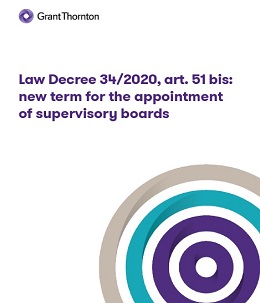Foreword
as under legislative decree n. 14 dated 12 January 2019, by amending the 2nd and 3rd paragraphs of art. 2477 of the Italian Civil Code, had originally provided for that the appointment of a board of statutory auditors or external auditor was compulsory for all companies, alternatively:
- required to draw up consolidated financial statements;
- controlling an entity subject to the legal audit of the accounts;
- exceeding for two subsequent FYs at least one of the following limitations:
- Euro 2 million of total assets in their balance sheet (now 4 million, pursuant to art. 2-bis, para. 2 of Law Decree n. 32/2019;
- Euro 2 million of revenues from sales and provisions (now 4 million, pursuant to art. 2-bis, para. 2 of Legislative Decree 32/2019);
- average number of 10 employees during the FY (now 20, pursuant to art. 2-bis, para. 2 of Legislative Decree 32/2019).
This provision should originally have become effective within “nine months” from the entry into force of art. 379 of the Code of corporate crisis, i.e. by 16 December 2019.
Art. 8, para. 6-sexies of the so-called “Milleproroghe” Decree
The 16 December deadline was amended upon converting into law, with amendments, Law Decree n. 162 dated 30 December 2019, so-called “Milleproroghe” Decree (decree extending the duration of various government measures).
Article 8, para. 6-sexies of Law Decree n. 162 dated 30 December 2019, as amended upon conversion, actually provides for a variable deadline for limited liability companies and cooperatives to appoint for the first time an external auditor or a board of statutory auditors, in compliance with the amendments introduced to the Italian Civil Code by the Code of corporate crisis and insolvency.
Pursuant to these provisions, the new deadline is postponed from 16 December 2019 to the date of approval of the financial statements for FY 2019. As expressly noted by the Minister during the Chamber of Deputies’ session of 5 February 2020, this norm does not provide for a mere extension of the deadline, but for an actual reopening of the terms, with a series of significant implications.
The first implication is that the financial statements considered in order to determine whether the limitations above have been exceeded are no longer those relevant to FYs 2018 and 2017, but to FYs 2018 and 2019.
Art. 51-bis of Law Decree n. 34 dated 19 May 2020, currently being converted into Law
It is worth recalling that upon conversion into law of the “Milleproroghe” Decree, an attempt had already been made to postpone the date of entry into force of art. 379 of the Code of corporate crisis, i.e. of the obligation to appoint a board of statutory auditors or external auditor, until the approval of the financial statements for FY 2021.
Proposal n. 8.3 contained in the Committee on Constitutional Affairs’ summary report n. 135 of 25 February 2020 actually already supposed that art. 379 would become effective after the end of the tax period underway at 31 December 2021. This proposed amendment was not considered, as the final text contained only the postponement of the requirement until the date of approval of the financial statements for FY 2019.
In any case, its contents are now being taken into account in the phase, currently underway, of conversion into law of Law Decree n. 34 of 2020.
The abovementioned amendment 8.3 was re-examined by the V permanent committee on financial statements and art. 51-bis was introduced, postponing until the approval of Financial Statements for FY 2021 the obligation for limited liability companies and cooperatives to appoint for the first time a board of statutory auditors or external auditor, in compliance with the new provisions introduced in the Civil Code by the Code of corporate crisis and insolvency.
In particular, art. 51-bis justifies this extension or, better, reopening of terms, with the aim of limiting the negative effects of the prevention and control measures related to the COVID-19 emergency on businesses.
We point out the press release issued by CNDCEC (Italian national council of chartered accountants) on 2 July 2020, which defined as “wrong and harmful” the emendation that extends to 2022 the term for the appointment of the board of statutory auditors or an external auditor of limited liability companies and cooperatives incorporated after 16 March 2019.
The assertion of the president of CNDCED is based on the fact that the companies that already appointed a board of statutory auditors or an external auditor would be penalised, as well as on the fact that there would be a time lag between the effective date of one of the most important new provisions of the Code of corporate crisis, i.e. the warning systems, and the appointment of the board of statutory auditors or external auditor for those companies that exceed one of the following limits for two consecutive years:
- total assets: 4 million Euros;
- revenues from sales and provisions: 4 million Euros;
- average number of employees in the FY: 20.
Financial Statements to be considered as reference
As previously mentioned, the original version of art. 379 of Legislative Decree no. 14/2019 referred – for the purposes of verifying if a company had exceeded the limits that would imply the obligation to appoint a board of statutory auditors or an external auditor – to the two financial statements preceding the (original) indicated deadline, i.e. those referred to FYs 2017 and 2018.
The conversion law of Law Decree n. 162 dated 30 December 2019 by extending the (original) term up to the date of approval of the financial statements referred to FY 2019, has subsequently modified the reference fiscal years for the purposes of verifying if a company has exceeded the above limits that would imply the obligation to appoint a board of statutory auditors or an external auditor. In fact, following the postponement of the term, the reference fiscal years are now 2018 and 2019.
With the approval of the abovementioned decree (which can be considered as final, given the short time for its conversion into law), the obligation to appoint a board of statutory auditors or an external auditor is postponed by two fiscal years and, subsequently, the financial statements to be considered as reference for the verification of the limits under art. 2477 are now those referred to FYs 2020 and 2021.
Already appointed boards of statutory auditors or external auditors
In case of appointment of an external auditor, the postponement of terms leads to two different approaches: the first one refers to the revocation request under art. 4, para. 1, letter i) of Ministerial Decree dated 2 December 2012, providing that the occurred groundlessness of the obligation to appoint an auditor due to the occurred lack of law requirements is a just cause for revocation; on the contrary, according to the second approach, based on the fact that it is not an occurred groundlessness but rather a postponement of terms, there is no cause for a revocation.
It must be pointed out that pursuant to art. 8 of Ministerial Decree no. 261/2012, an auditor whose office has terminated cannot be re-appointed before one year after such termination date. On this issue, research document no. 234 issued by Assirevi (Italian association of audit companies) specifies that the “cooling off” obligation – i.e. the impossibility to appoint the same auditor before one year after the relevant revocation – does not apply in case of consensual termination of the audit assignment.
In case of appointment of a supervisory board, a board of statutory auditors or a sole statutory auditor, being also in charge of the audit activity, there is no just cause for termination of office among those provided under art. 2399 of the Italian Civil Code, nor a just cause for revocation pursuant to art. 2400 of the Italian Civil Code; therefore, except for the case of voluntary resignation, they must remain in office up to the termination date of their office and perform the audit on the approved financial statements.
Our professionals would be pleased to provide you with any further information you may need.

